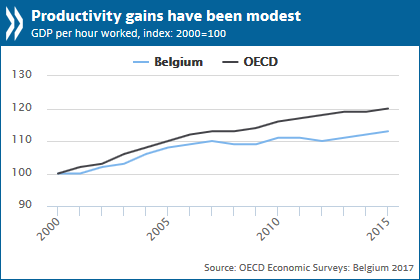Public investment, tax and education reforms will help bolster inclusive growth in Belgium
A combination of market-based policies and a redistributive welfare state have boosted Belgium’s per-capita GDP to well above the average of OECD countries and raised well-being, according to a new OECD report.

The latest OECD Economic Survey of Belgium, says that the country performs generally strongly across a number of well-being dimensions, notably work- life balance, health, education and civic engagement. Income inequality after tax and transfers is comparatively low, while Belgium has the lowest gender wage gap among the OECD economies.
Sound macro-economic policies have been supported by important reforms in areas such as taxation, the wage-setting system, pensions, unemployment benefits, as well as measures to improve the business environment for small firms and the self-employed.
However, Belgium still faces important challenges: public investment is too low, the tax mix is not sufficiently aimed at ensuring inclusive growth, and education and labor market policies need to address weak achievement levels among immigrants and other disadvantaged groups.
Presenting the survey in Brussels at a news conference alongside Belgian Prime Minister Charles Michel, OECD Secretary-General Angel Gurría said: “In a difficult global context, it is encouraging to see that Belgium’s economy is gathering speed, albeit at a modest pace compared to pre-crisis levels. There is much to be positive about, and Belgium possesses the necessary determination to address the significant challenges it continues to face. A focus on public investment and tax and education reforms are important actions in order to boost growth and make it more inclusive, so everyone benefits.”
The Survey says that improving productivity, where gains have been moderate in recent years, is vital to sustain increases in living standards across the population. This can be achieved by boosting business dynamism and innovation; improving public infrastructure to reduce traffic congestion around major cities, and by widespread diffusion of advanced technologies.
To ensure the fruits of economic growth are shared more widely, the Survey also says labor market inequalities and large regional disparities in employment and educational outcomes must be addressed. Youth joblessness is above the EU average while the gap in employment rates between second-generation non-European immigrants and people with a non-immigrant background is among the highest in the EU. A young person with an immigrant background is only 65% as likely to obtain a tertiary degree as their native peers; almost the lowest ratio across the OECD.
The Survey stressed that improving opportunities to acquire and maintain skills is particularly important to better integrate youth, older workers and low-skilled immigrants into the labor market. There is room to increase participation in training, and a need to increase spending on higher education.
Other policy recommendations in the report call on the government to:
•Raise public investment in transport infrastructure, financed by user fees, public spending efficiency gains and leverage of private funds.
•Lower employer social security contributions on low wages further and consider introducing a federal capital gains tax, as part of a broader reform of household savings taxation.
•Reduce the federal corporate tax rate and reform exemptions that facilitate tax avoidance.
•Ensure firms comply with new legislation to provide workers with at least five working days of education and training per year.
•Improve incentives to attract experienced teachers where they are needed the most and reduce the concentration of disadvantaged students in some schools.
•Raise tuition fees backed by income contingent loans and grants for the most disadvantaged students.
•Strengthen entrepreneurship education and promote further venture capital to support the development of start-ups.
Source: Organization for Economic Co-operation and Development
- 296 reads
Human Rights
Ringing FOWPAL’s Peace Bell for the World:Nobel Peace Prize Laureates’ Visions and Actions

Protecting the World’s Cultural Diversity for a Sustainable Future

The Peace Bell Resonates at the 27th Eurasian Economic Summit

Declaration of World Day of the Power of Hope Endorsed by People in 158 Nations

Puppet Show I International Friendship Day 2020

